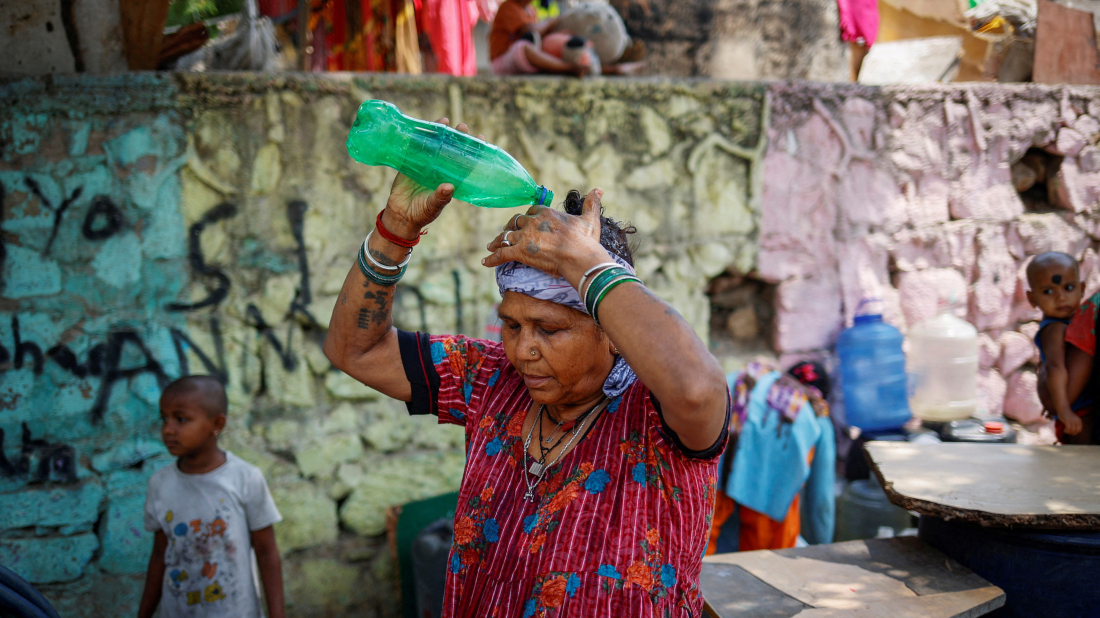At least 4 dead and 17 injured in truck explosion in Santiago
At least four people have died and 17 others were injured after a liquid gas truck overturned and exploded in Santiago, Chile’s capital, authorities...

A severe heatwave in India and Pakistan is testing the limits of human survival, with temperatures expected to rise to dangerous levels in the coming days. The early onset of summer heat has already strained energy supplies, impacted vital crops, and placed millions of livelihoods at risk.
Both nations, which typically experience heatwaves in May and June, are facing extreme temperatures much earlier this year, with the heat expected to last longer than usual.
In Pakistan, temperatures are forecast to soar up to 8 degrees Celsius above normal between April 14-18. Parts of Balochistan, in the southwest, could experience maximum temperatures nearing 49°C (120°F), similar to the sweltering conditions of Death Valley, one of the hottest places in the world.
The heatwave has caught many by surprise, particularly in areas like Balochistan’s Dera Murad Jamali city, where persistent power outages lasting up to 16 hours a day have exacerbated the effects of the extreme heat, making daily life unbearable. "This has intensified the impact of the heat, making it harder for people to cope," said local resident Ayoub Khosa.
In neighboring India, the heat has also arrived earlier than expected. The capital, New Delhi, has already experienced temperatures over 40°C (104°F) several times this month, and the meteorological department has warned of an above-normal number of heatwave days. Other regions, including Rajasthan, are also grappling with scorching temperatures, with maximum temperatures reaching 44°C (111°F).
Farmers in Rajasthan are particularly vulnerable, with many reporting health issues due to the extreme conditions. "We cannot even stand to work in it," said farmer Balu Lal. "When I am out, I feel that people would burn due to the heat outside." The early onset of heat is also disrupting crop cycles, with young plants struggling to survive in the dry heat. The rising temperatures are further complicating food production, as crops that are not yet ready to harvest are failing due to a lack of water and excessive heat.
Experts warn that the rising temperatures are pushing the limits of human survivability. Heatwaves have already claimed tens of thousands of lives in the region in recent decades, and climate experts predict that by 2050, India could be among the first places where temperatures exceed survivability thresholds. Pregnant women, in particular, are at risk, with an increase in preterm births and pregnancy-related complications, according to Neha Mankani, an advisor at the International Confederation of Midwives.
The cascading effects of the heatwave are devastating. Food shortages, drought, and flash floods are expected to become more frequent, as melting ice caps disrupt water availability. Mehrunissa Malik, a climate change expert, highlighted the impact on farmers, explaining that erratic weather patterns are making it increasingly difficult to predict crop yields, which are now being hit by both the heat and pest attacks.
With power shortages already plaguing both countries, demand for electricity is expected to soar, exacerbating the ongoing energy crisis. In some areas, schools have been closed, and transportation systems have been disrupted, further highlighting the far-reaching consequences of the heat.
As heatwaves continue to become more frequent and intense, millions of people in India and Pakistan face a future of increased vulnerability, with food production, health, and livelihoods increasingly at risk.
The drumbeats have finally faded at the Marquês de Sapucaí, bringing the competitive phase of the Rio Carnival 2026 to a dazzling close. Over two marathon nights of spectacle, the twelve elite schools of the "Special Group" transformed the Sambadrome into a riot of colour.
Israel is preparing for the possibility of receiving a green light from the United States to launch strikes against Iran’s ballistic missile system, according to Israel’s public broadcaster KAN.
Aghdam’s Qarabag FK experienced a 6–1 defeat to England’s Newcastle United in the first leg of their UEFA Champions League play-off tie in Azerbaijan's capital Baku Wednesday evening (18 February).
Qarabağ FK are facing Newcastle United in the UEFA Champions League play-off round on Wednesday evening in Baku, in what will be the first UEFA competition meeting between the two clubs.
Start your day informed with AnewZ Morning Brief: here are the top news stories for the 18th of February, covering the latest developments you need to know.
Mexican authorities have uncovered a 22-metre tunnel used to siphon fuel from a state-owned pipeline, shedding light on the country’s long-running battle against a lucrative black-market trade often controlled by organised crime.
At least four people have died and 17 others were injured after a liquid gas truck overturned and exploded in Santiago, Chile’s capital, authorities confirmed on Thursday.
Day 13 of the Milano Cortina 2026 Winter Olympics featured decisive finals, thrilling performances and packed arenas across Milan, Livigno, and Cortina d’Ampezzo. The Games combined precision, speed, and drama, marking another memorable day in the Winter Olympics.
Gianni Infantino, president of the Fédération Internationale de Football Association (FIFA), announced a new partnership with the Board of Peace on Thursday (19 February), committing to build football pitches and arenas in Gaza as part of broader efforts to rebuild the region.
The Board of Peace will be "looking over the United Nations," said U.S. President Donald Trump at the inaugural Washington meeting, where representatives from over 20 countries gathered to unveil plans for Gaza’s reconstruction and coordinate international support.
You can download the AnewZ application from Play Store and the App Store.

What is your opinion on this topic?
Leave the first comment